WHAT IS THE BERGAMOT?
The bergamot is a wonderfully unique citrus that makes its home in Calabria. It’s quite puzzling, this strange fruit with a bitter, almost musty-smelling pulp and incredibly light, fragrant zest. Equally intriguing, the bergamot’s complex properties lend themselves to a wide variety of uses and products – from perfume to cuisine to pharmaceuticals – positively jaw dropping!
The bergamot is round, slightly larger than an orange and not as yellow as a lemon. The skin is thin and has a delicate fragrance while the interior is extremely pungent and resembles that of a grapefruit.
Historically, this citrus has been prized principally for its essential oil that is obtained by pressing the skin. 90% of bergamot oil on the world market comes from Calabria, specifically, the Province of Reggio Calabria in the southernmost part of the region. The plant only grows in a small area ranging from Villa San Giovanni, just north of Reggio to Monasterace, which is around the tip about 100 miles along the coast.

The “Macchina Calabrese” – historical examples of the machine, invented in 1844, that mechanized the pressing of oil from the skin
PERFUME, FOOD AND DRUGS
The perfume industry claims the lion’s share of bergamot oil. Since 1709 when the essential oil became an important ingredient in the famous Eau de Cologne, the bergamot has been a key ingredient in scents ranging from the classic Chanel No. 5 to Dior’s very recent Sauvage, promoted by Johnny Depp. Interestingly, bergamot oil not only lends a fresh, zesty scent to perfume, but it also prolongs the fragrance for up to sixteen hours.
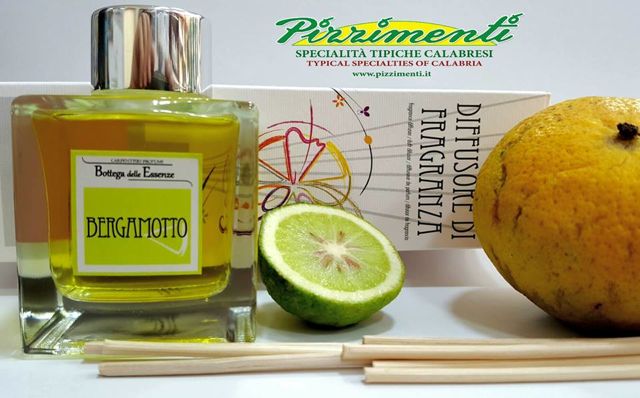
Bergamot Essential Oil Diffuser, Bottega delle Essenze
Gastronomically, the bergamot is best known for the flavor it gives to Earl Grey tea. This characteristic taste comes from the essential oil, and today many different teas incorporate its oil as a principal ingredient. Another classic use is in hard candy, and the French, who are the biggest importers of the essential oil, have been making their Bergamote de Nancy for over 150 years. In addition to the classic international uses of the bergamotto, Calabrians have been taking advantage of the unique flavor in their baking and distilling for a very long time.

Traditional homeopathic applications of the bergamot have also been carried out by the Calabrian people over several centuries, and the fruit has been used for everything from insect repellent to the ministration of wounds and as a treatment for malaria. More recently, this fruit has been the focus of studies that have shown it to reduce total cholesterol, lower blood pressure and decrease blood sugar levels. It’s a veritable cocktail all wrapped up in a very sweet smelling skin!
REGGIO, BERGAMOT CITY
At one time, the city of Reggio was renowned for its fragrant citrus fields. Edward Lear, the prominent 18th-century artist and writer, described it as “one vast garden, and doubtless one of the loveliest spots to be seen on earth,” citing its orange, lemon, citron and bergamot groves. The city has since expanded, and although Reggio’s downtown is lovely with a stupendous view of the Strait of Messina, today’s traveler would be hard-pressed to find a bergamot tree in the historic center, until this past spring, that is.
With the reopening of Reggio’s renovated Archeological Museum, the municipal government spruced up Piazza De Nava, which faces it, and ceremoniously planted a handful of bergamot trees. Pietro Pizzimenti, the proprietor of Pizzimenti Specialità Tipiche Calabresi, followed suit and planted a tree in Piazza Reitano, recently renamed after the icon of Italian folk music, Calabrian Mino Reitano. These trees were planted not only as a symbolic gesture of the return of the bergamot in the city center, but also, now residents and tourists can actually see the trees in the heart of Reggio, the Città del Bergamotto.
MOUTHWATERING BERGAMOT RECIPES
On the food front, the bergamot has been gaining ground in recent years. More and more people are discovering the taste sensations of this unusual citrus. And just this year, a couple of large supermarket chains started selling them in Italy’s northern regions.
A few months ago, I received an email and then a phone call from a new fan of this special fruit, John F. Carafoli, food writer and stylist, whose book Great Italian American Food of New England will be coming out next month. He had traveled to Calabria for the first time (with my book under his arm!) and was blown away by the food, this unique citrus in particular. He returned home and immediately started experimenting in his kitchen, creating several recipes, such as Bergamot Vodka Martini, Bergamot-Infused Vodka, Bergamot Panna Cotta and Bergamot Olive Oil Cake.
Ever since I first tasted honey with bergamot, I’ve raved about it. I mostly put it in my tea. John was inspired to mix a batch of his own with a jar of quality honey and a drop of the essential oil. He then drizzled it over a nice piece of pecorino (sheep’s cheese) and paired it with the region’s Cirò wine for a delicious appetizer. Squisito! (Exquisite, as they’d say in downtown Reggio.)
I always enjoy a dish of bergamot gelato and I won’t ever say no to a bergamot liquor, but the citrus is not just limited to sweets and alcohol. Seasoning the local swordfish, exalting a risotto dish or assuaging a Calabrian sausage – the possibilities are limitless. Why not start out with a refreshing bergamot granita?
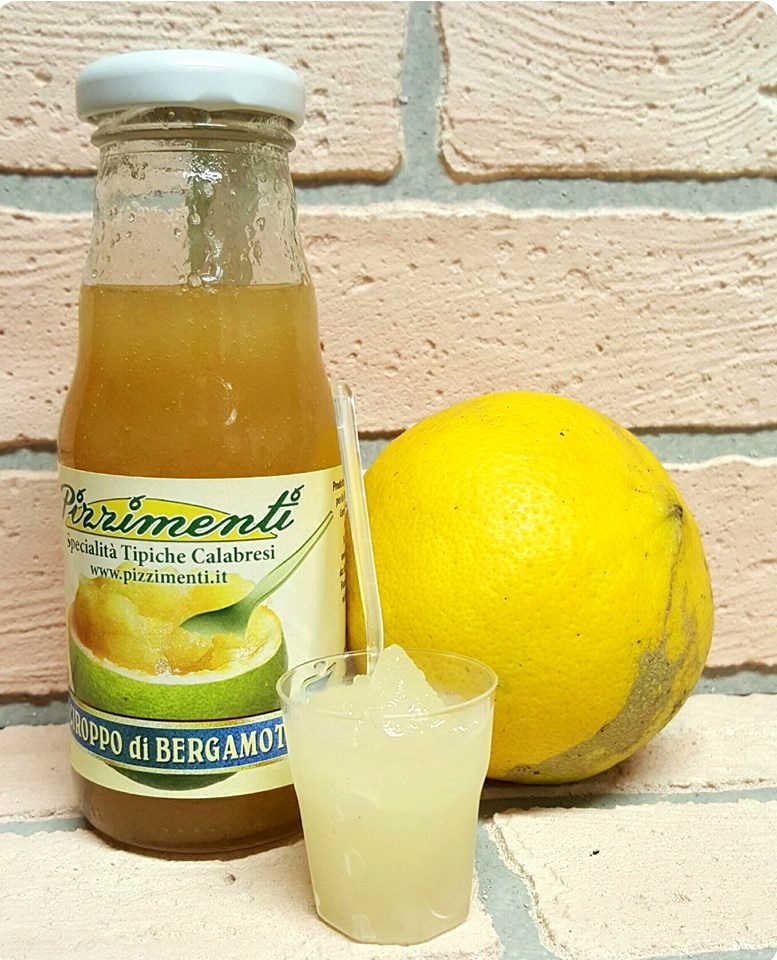
A Bergamot Granita made with Pizzimenti’s bergamot syrup
Read more about this incredible citrus in the Chapter “Only in Calabria” of Calabria: The Other Italy, a nonfiction
Get up-close and personal with the bergamot on one of my CALABRIA TOURS, where you will have the opportunity to taste products made from both the oil and the pulp of this versatile citrus fruit. And visit Reggio’s Bergamot Museum.
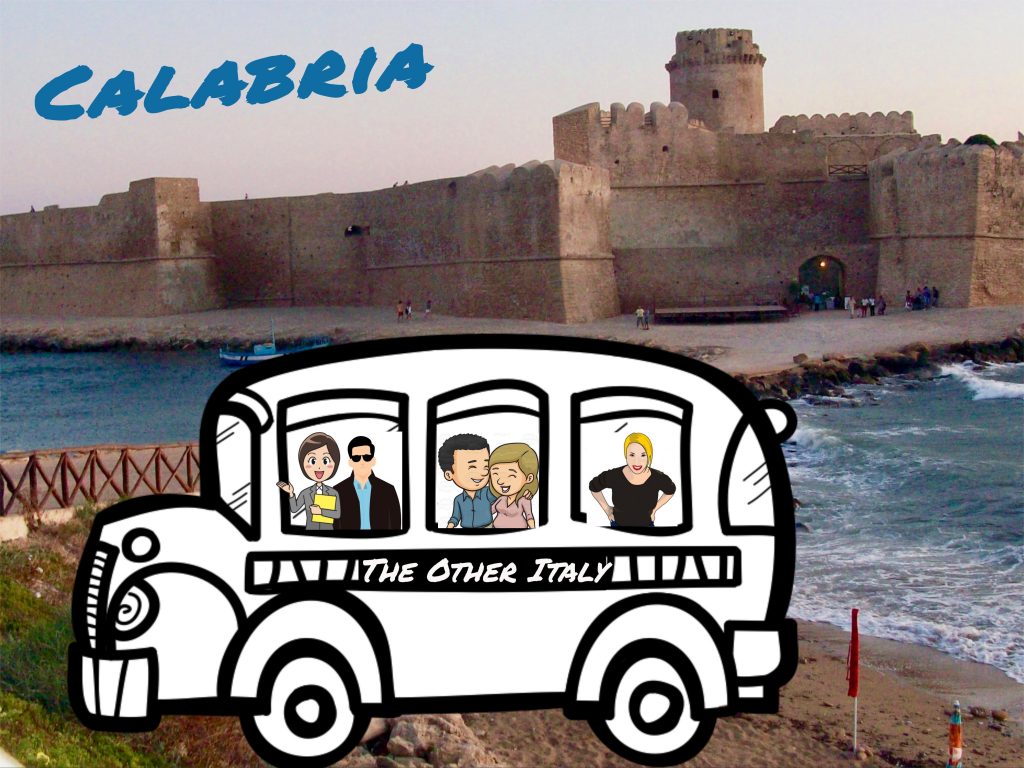
Pizzimenti’s wide variety of Specialty Products from Calabria are available directly in their one-and-only store on Corso Garibaldi 263 in Reggio Calabria, or if you can’t make it to Calabria in person, from their website Pizzimenti Specialità Tipiche Calabresi.
Read about another extraordinary Calabrian citrus in my blogpost Santa Maria del Cedro and the Precious Diamante Citron. Other specialties of the region include the Peperoncino calabrese and the Annona.
“Like” Calabria: The Other Italy’s Facebook page and follow me on Karen’s Instagram and Karen’s Twitter for more beautiful pictures and information.
Sign up below to receive the next blog post directly to your email for free.
CALABRIA: THE OTHER ITALY makes a great gift!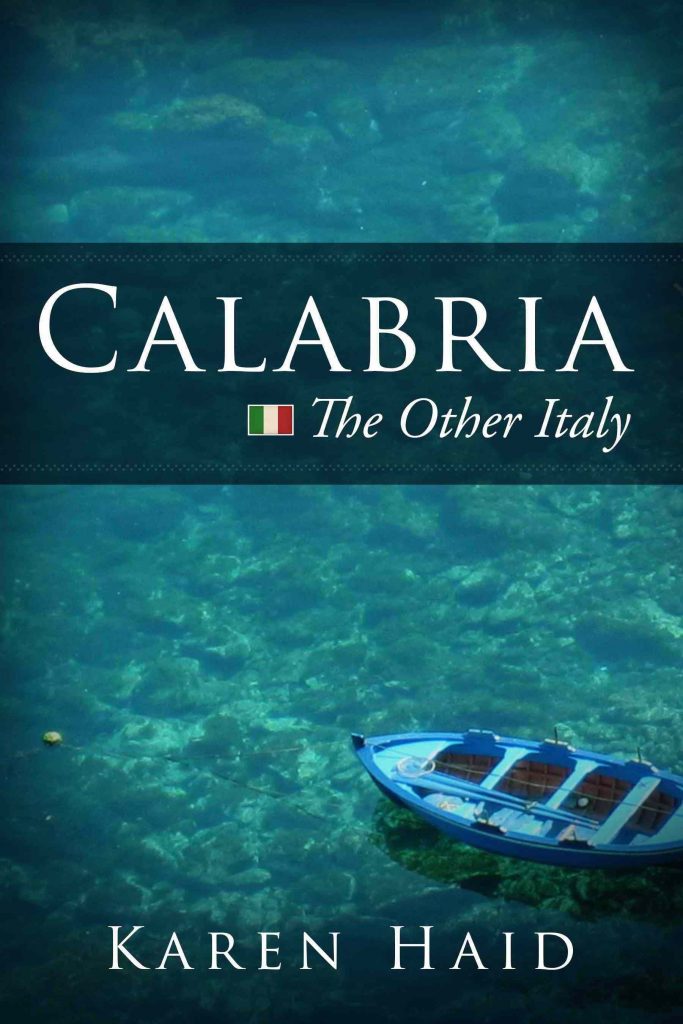
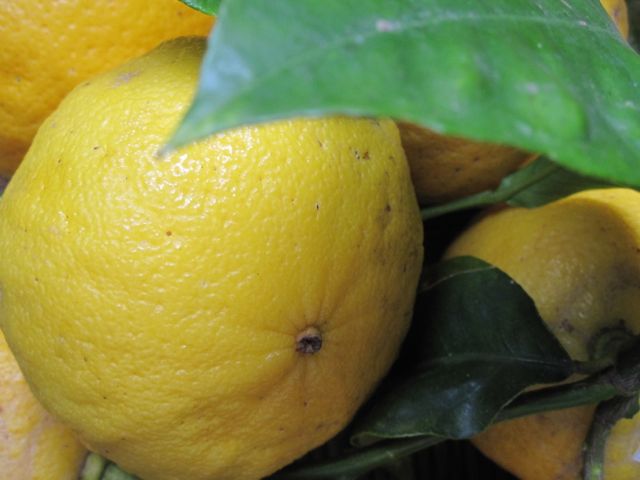

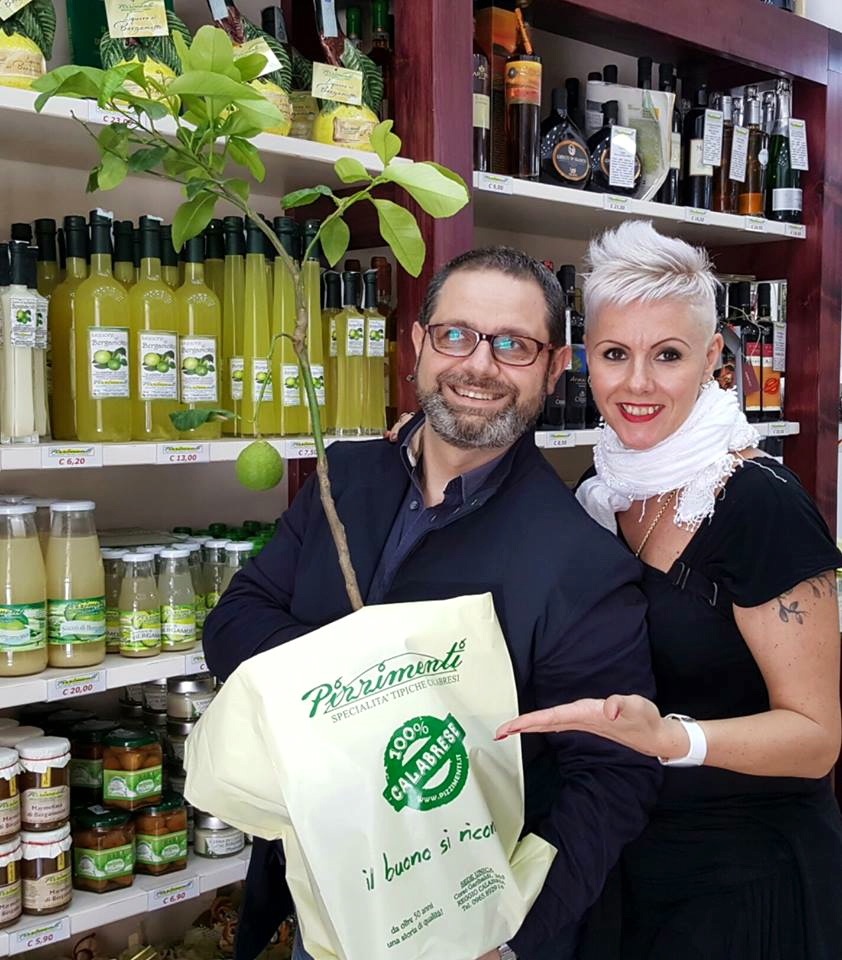

Comments 23
Intriguing to find all the uses of this Calabrian fruit! Previously I had only known of bergamot as a flavoring to Earl Grey teas. Does anyone eat the bergamot fruit on its own? If so, does it taste closer to a grapefruit, a lemon, or an orange?
Author
It isn’t generally eaten as a piece of fruit, but the flavor is unique, much more bitter than the other citrus.
What is the scientific name of the citrus Bergamot from Calabria
Author
Citrus bergamia
hello,
I would like to buy 100 kilos from the producers directly. This is to be in either powder or liquid form.
Whom can I contact?
Thank you
Author
I’m not in the bergamot business but I’ll ask around and send you a private message.
So, Earl Grey tea is my favorite and I never read the label fully until now! Great article about an important contribution to world cuisine! I am sharing with the Chicago Gourmets and Conversational Italian! groups on Facebook.
Author
Facts and stories about Calabria frequently elicit, “Wow, who knew?” The bergamot is definitely high amongst them. Thanks for the shares!
Lovely blog
Loved Calabria The Other Italy
I would like to order some of the specialty products but can not find the English version. Can you help?
Author
Glad you enjoyed Calabria: The Other Italy – always great to hear! As for Pizzimenti’s website, there isn’t an English version at this time. In the other message you sent on the contact form you indicated an interest in my Calabria Cultural Tour. You would be able to visit the shop in person on the tour! I’ll send you more information in a private message.
Hi Karen
Do you know if Diamante citron is the same as the Bergamot or are they 2 different things?
JO
Author
The bergamot and the Diamante citron are two different citrus fruit. You can read more about the bergamot in my book Calabria: The Other Italy, and here’s a link to my article about the Diamante citron: Santa Maria del Cedro and the Precious Diamante Citron.
Loved this article! I’ve got a bag of bergamot on my counter, does anyone know where to point me to some recipes I can use it in?
Author
You’ll have to experiment. When I wrote this article, there was a link to the recipes I mentioned, but I took it out when the website took the page down after a couple of years. The recipes used the essential oil, which is what is generally used in cooking. You won’t get much oil from the skin of a few bergamots, but you could try using the zest. Also, you could make a marmalade, keeping in mind you’ll need a lot of sugar as the pulp is extremely bitter. I’ve made cookies using an orange marmalade recipe with bergamot marmalade I had purchased once. You can juice it to drink – watered down and/or with sugar – as the juice is very healthy.
I haven’t tried this fruit I’ve been reading about it and my Italian relatives have mentioned it to me that I should try it they’ve been using it for years
Author
The essence obtained from the skin lends a delicate citrus flavor to recipes, while the bitter pulp is excellent for marmalade.
Very interesting reading about this fruit grown in Italy
Author
It’s grown specifically in the Province of Reggio Calabria at the tip of the toe of the Italian boot.
Also it is good to know that the oil from the Bergamot makes the skin very very sensitive to the sun !!! Be careful!! The juice and other supplements derived from Bergamot have been found to lower cholesterol.
My family lives in The Province of Reggio Calabria , and I was fortunate enough to visit a Bergamot producer in Brancaleone!
Ciao!! Loved the Book.. interesting the tours you’re offering!!!
Author
So glad you enjoyed my book! My tours are quite interesting, indeed, and we have the opportunity to sample products made from the bergamot. On the Traditions and Food of Calabria Tour, we visit Reggio’s Bergamot Museum, and we also have lunch by a bergamot grove on the Calabria Cultural Tour. We have guests with local family heritage as well as those without any Italian blood whatsoever and they all feel as though they truly gain a better knowledge and understanding of the land and its people with these in-depth Calabria tours. (And also had a lot of fun along the way!)
I do mention the skin’s photosensitivity to the oil in my book, as it was erroneously used in suntan lotions to promote tanning at one time; however, today, skincare products with bergamot oil are treated in a way to eliminate that problem.
Hello , I am interested in the Bergamot tree
, the one for lowering cholesterol, is it the green fruit ? I have family in Scilla Reggio Calabria , I am in Southern California . Will the Bergamot tree grow here ?
Is there any way to ship a starter tree to California ?
Author
The bergamot only grows in a handful of places in the world, the Province of Reggio Calabria being almost an exclusive location. While there has been limited success with growing a type of bergamot in California, the question remains as to the cholesterol-lowering properties of the plant that may be able to fruit in that environment. You should speak with an expert California gardener, but I would say that you would in all likelihood not have success in shipping a tree. In addition, there are very strict import regulations in the United States. By the way, the fruit is green before it ripens to yellow.